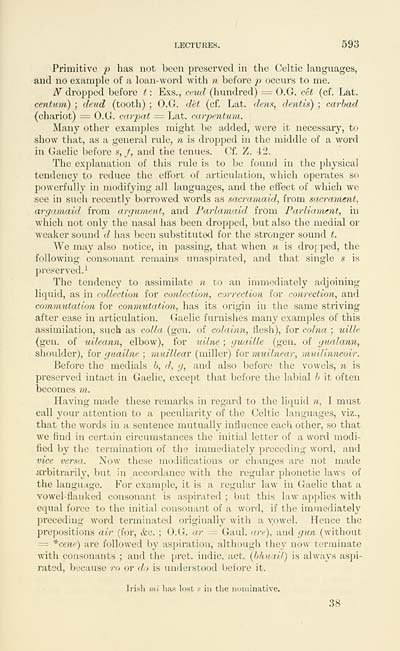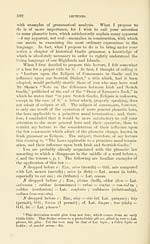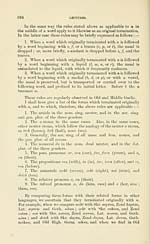Ossian Collection > Reliquiae Celticae > Volume 2
(607)
Download files
Complete book:
Individual page:
Thumbnail gallery: Grid view | List view

LECTURES. 593
Primitive p has not been preserved in the Celtic languages,
and no example of a loan-word with n before p occurs to me.
N dropped before t : Exs., caud (hundred) =^ O.G. cet (cf. Lat.
centum) ; deiid (tooth) ; O.G. d'et (cf. Lat. densi, dentis) ; carbad
(chariot) = O.G. carpat =^ Lat. mrpentum.
Many other examples might i)e added, were it necessary, to
show that, as a general rule, n is dropped in the middle of a word
in Gaelic before s, /, and the tenues. Cf. Z. 42.
The explanation of this rule is to be found in the physical
tendency to reduce the effort of articulation, which operates so
powerfully in modifying all languages, and the effect of which we
see in such recently borrowed words as sacramaid, from sacrament,
argamaid from argument, and Parlamaid from Parliament, in
which not only the nasal has been dropped, but also the medial or
weaker sound d has been substituted for the stronger sound t.
We may also notice, in passing, that when n is droj ped, the
following consonant remains unaspirated, and that single s is
preserved. 1
The tendency to assimilate n to an immediately adjoining
liquid, as in collection for conlection, correction for conrection, and
co7n7mitat{on for conmutation, has its origin in the same striving
after ease in articulation. Gaelic furnishes many examples of this
assimilation, such as colla (gen. of colainn, flesh), for colna ; uille
(gen. of uileann, elbow), for uilne ; giiaille (gen. of yualann,
shoulder), for guailne ; muilleav ( miller) for muilnear, muilinneoir.
Before the medials b, d, g, and also before the vowels, n is
preserved intact in Gaelic, except that before the labial h it often
becomes m.
Having made these remarks in regard to the liquid >i, I must
call your attention to a peculiarity of the Celtic languages, viz.,
that the words in a sentence mutually influence each other, so that
we find in certain circumstances the initial letter of a word modi-
fied by the termination of the immediately j)receding word, and
vice versa. Now these modifications or changes are not made
aTbitrarily, but in accordance with the regular phonetic laws of
the language. For example, it is a regular law in Gaelic that a
vowel-flanked consonant is aspirated ; but this law applies with
equal force to the initial consonant of a word, if the immediately
preceding word terminated originally with a vowel. Hence the
prepositions air (for, ifec. ; O.G. a.r --= Gaul, uri'), and gun (without
= *cen(') are followed bj'^ aspiration, although they now terminate
with consonants ; and the pret. indie, act. (bhinii/) is always aspi-
rated, because ro or do is uudeistood before it.
Irish mi has lost >■ in the nominative.
38
Primitive p has not been preserved in the Celtic languages,
and no example of a loan-word with n before p occurs to me.
N dropped before t : Exs., caud (hundred) =^ O.G. cet (cf. Lat.
centum) ; deiid (tooth) ; O.G. d'et (cf. Lat. densi, dentis) ; carbad
(chariot) = O.G. carpat =^ Lat. mrpentum.
Many other examples might i)e added, were it necessary, to
show that, as a general rule, n is dropped in the middle of a word
in Gaelic before s, /, and the tenues. Cf. Z. 42.
The explanation of this rule is to be found in the physical
tendency to reduce the effort of articulation, which operates so
powerfully in modifying all languages, and the effect of which we
see in such recently borrowed words as sacramaid, from sacrament,
argamaid from argument, and Parlamaid from Parliament, in
which not only the nasal has been dropped, but also the medial or
weaker sound d has been substituted for the stronger sound t.
We may also notice, in passing, that when n is droj ped, the
following consonant remains unaspirated, and that single s is
preserved. 1
The tendency to assimilate n to an immediately adjoining
liquid, as in collection for conlection, correction for conrection, and
co7n7mitat{on for conmutation, has its origin in the same striving
after ease in articulation. Gaelic furnishes many examples of this
assimilation, such as colla (gen. of colainn, flesh), for colna ; uille
(gen. of uileann, elbow), for uilne ; giiaille (gen. of yualann,
shoulder), for guailne ; muilleav ( miller) for muilnear, muilinneoir.
Before the medials b, d, g, and also before the vowels, n is
preserved intact in Gaelic, except that before the labial h it often
becomes m.
Having made these remarks in regard to the liquid >i, I must
call your attention to a peculiarity of the Celtic languages, viz.,
that the words in a sentence mutually influence each other, so that
we find in certain circumstances the initial letter of a word modi-
fied by the termination of the immediately j)receding word, and
vice versa. Now these modifications or changes are not made
aTbitrarily, but in accordance with the regular phonetic laws of
the language. For example, it is a regular law in Gaelic that a
vowel-flanked consonant is aspirated ; but this law applies with
equal force to the initial consonant of a word, if the immediately
preceding word terminated originally with a vowel. Hence the
prepositions air (for, ifec. ; O.G. a.r --= Gaul, uri'), and gun (without
= *cen(') are followed bj'^ aspiration, although they now terminate
with consonants ; and the pret. indie, act. (bhinii/) is always aspi-
rated, because ro or do is uudeistood before it.
Irish mi has lost >■ in the nominative.
38
Set display mode to: Large image | Transcription
Images and transcriptions on this page, including medium image downloads, may be used under the Creative Commons Attribution 4.0 International Licence unless otherwise stated. ![]()
| Early Gaelic Book Collections > Ossian Collection > Reliquiae Celticae > Volume 2 > (607) |
|---|
| Permanent URL | https://digital.nls.uk/81694070 |
|---|
| Description | Vol. II. |
|---|---|
| Shelfmark | Oss.288 |
| Attribution and copyright: |
|
| Description | Selected books from the Ossian Collection of 327 volumes, originally assembled by J. Norman Methven of Perth. Different editions and translations of James MacPherson's epic poem 'Ossian', some with a map of the 'Kingdom of Connor'. Also secondary material relating to Ossianic poetry and the Ossian controversy. |
|---|
| Description | Selected items from five 'Special and Named Printed Collections'. Includes books in Gaelic and other Celtic languages, works about the Gaels, their languages, literature, culture and history. |
|---|

